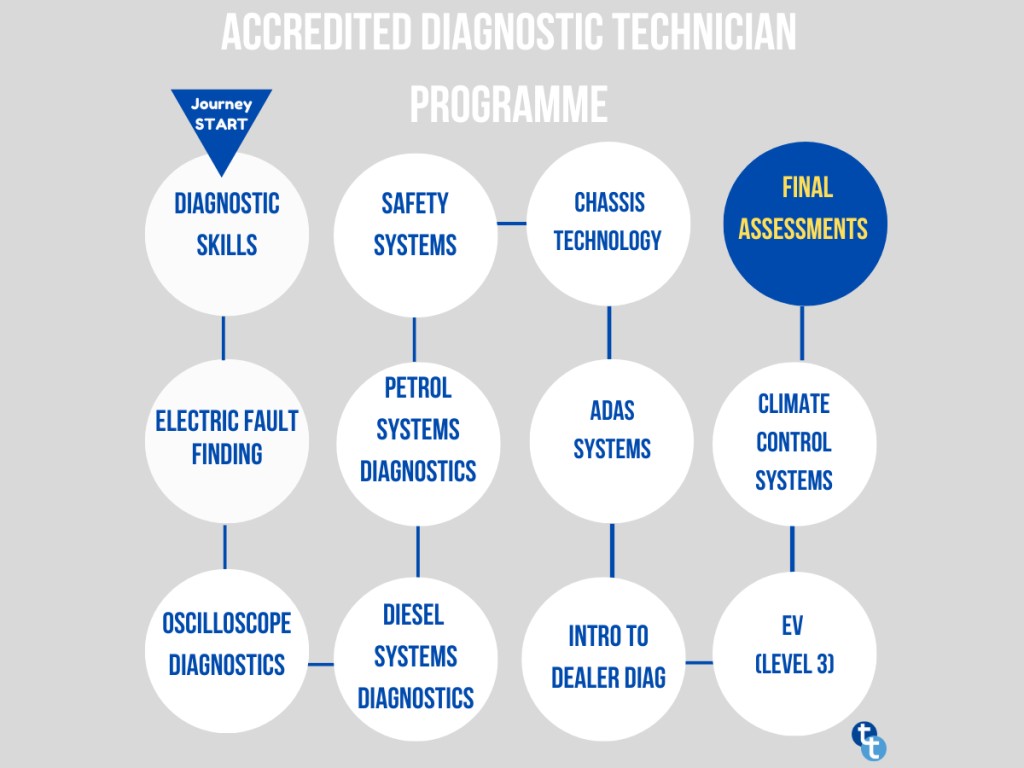Are you fascinated by the intricate systems of modern vehicles and possess a knack for problem-solving? A career as a car diagnostic technician could be your perfect fit. This in-depth guide, brought to you by Car Repair Online experts, will provide you with a clear roadmap on how to become a skilled and sought-after diagnostic technician in the automotive industry.
What Does a Car Diagnostic Technician Do?
Modern cars are complex machines, relying heavily on electronic control units and sensors. When something goes wrong, it’s the diagnostic technician who steps in to unravel the issue. Unlike general mechanics who handle routine repairs and maintenance, diagnostic technicians specialize in identifying the root cause of vehicle malfunctions. They utilize advanced diagnostic tools, software, and their expert knowledge to pinpoint problems that are not always immediately obvious.
Their responsibilities typically include:
- Utilizing Diagnostic Equipment: Operating scan tools, multimeters, and other specialized equipment to read fault codes and analyze vehicle data.
- System Analysis: Understanding complex vehicle systems, including engine management, braking, transmission, and electrical systems, to interpret diagnostic findings.
- Troubleshooting: Systematically investigating the cause of faults, often involving intricate electrical and mechanical checks.
- Repair Recommendations: Providing accurate diagnoses and recommending effective repair procedures to mechanics or customers.
- Staying Updated: Keeping abreast of the latest automotive technologies and diagnostic techniques through continuous professional development.
Essential Skills and Qualities
To excel as a diagnostic technician, you’ll need a blend of technical skills and personal attributes:
- Strong Technical Aptitude: A deep understanding of automotive systems and how they interact is crucial.
- Problem-Solving Prowess: Excellent analytical and logical thinking skills to systematically diagnose complex issues.
- Computer Literacy: Proficiency in using diagnostic software, computer systems, and online resources.
- Attention to Detail: Meticulous and thorough in your approach to ensure accurate diagnoses.
- Continuous Learning Mindset: The automotive industry is constantly evolving, requiring a commitment to ongoing learning and adaptation.
- Good Communication Skills: The ability to clearly explain technical issues and repair recommendations to colleagues and sometimes customers.
Education and Training Pathways
While formal qualifications aren’t always mandatory, structured training is highly recommended to become a competent diagnostic technician. Here’s a typical pathway:
-
Foundational Automotive Knowledge: Begin by gaining experience as a general service technician or mechanic. This usually involves completing a Level 2 automotive qualification (or equivalent depending on your country) which provides a solid grounding in vehicle mechanics and servicing. This initial phase typically takes around 3 years of practical experience in a workshop or garage environment.
-
Specialized Diagnostic Training Programs: To become a Diagnostic Technician, you will need to enroll in a specialized training program. These programs are designed to elevate your skills to a diagnostic level. Look for accredited automotive training centers that offer Diagnostic Technician programs. These programs typically involve a mix of theoretical knowledge and hands-on practical training.
-
Accredited Assessments: Reputable Diagnostic Technician programs culminate in a series of practical technical skills assessments. Successful completion of these assessments is often required to gain official Diagnostic Technician recognition or certification. Passing these assessments validates your competency and expertise in vehicle diagnostics.
-
Continuous Professional Development (CPD): Even after becoming qualified, the learning journey continues. Diagnostic technicians need to engage in regular CPD to stay updated with the latest vehicle technologies, diagnostic tools, and repair techniques. Many accredited training providers offer ongoing technical updates and re-accreditation programs.
How Long Does it Take?
The journey to becoming a fully qualified Diagnostic Technician typically takes between 18 months to 2 years of dedicated training after you have gained sufficient foundational experience as a mechanic (around 3 years). Training programs are often structured in cohorts, allowing technicians to learn and progress together, building a professional network and support system.
 Diagnostic Technician course plan
Diagnostic Technician course plan
Diagnostic Technician training programs cover a wide range of subject areas essential for effective vehicle diagnostics, including:
- Advanced Engine Management Systems
- Vehicle Electrical and Electronic Systems
- CAN Bus and Vehicle Networking
- Diagnostic Tools and Software Proficiency
- Advanced Fault Finding Techniques
- Vehicle System Diagnostics (ABS, Transmission, Airbag Systems etc.)
Earning Potential and Career Progression
Diagnostic technicians are highly valued in the automotive industry due to their specialized skills. This expertise translates to a higher earning potential compared to general mechanics. Salaries for diagnostic technicians vary based on experience, location, and employer, but generally, they command a competitive salary reflecting their advanced skillset. To get an idea of current salary ranges in your region, it’s recommended to check job sites like Indeed or Glassdoor for “Diagnostic Technician” positions.
Furthermore, becoming a Diagnostic Technician opens doors for career advancement. Experienced technicians can progress to roles such as:
- Master Technician: The highest level of automotive technical qualification, demonstrating exceptional expertise and leadership skills.
- Workshop Foreman or Supervisor: Leading and managing a team of technicians in a workshop environment.
- Service Manager: Overseeing the service department of a dealership or repair facility.
- Technical Trainer or Assessor: Sharing expertise by training and assessing aspiring technicians.
Take the Next Step in Your Automotive Career
If you are passionate about automotive technology and eager to specialize in diagnostics, becoming a Car Diagnostic Technician is a rewarding and challenging career path. By gaining foundational experience, undertaking specialized training, and committing to continuous learning, you can establish yourself as a highly skilled and sought-after professional in the automotive repair industry.
To explore Diagnostic Technician training programs and take the next step in your career, research accredited automotive training centers in your area and inquire about their Diagnostic Technician programs. This is your opportunity to elevate your skills, increase your earning potential, and become a vital asset in the world of modern vehicle repair.
